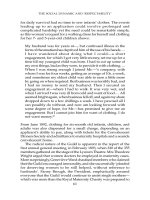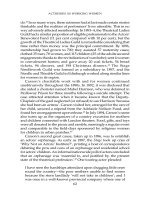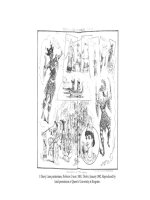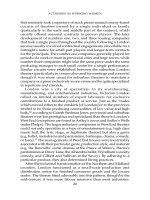ACTRESSES AS WORKING WOMEN 189
Bạn đang xem bản rút gọn của tài liệu. Xem và tải ngay bản đầy đủ của tài liệu tại đây (24.85 KB, 1 trang )
ACTRESSES AS WORKING WOMEN
Cissy, Haydee, and Ethel: You ladies by birth are a curious lot!
Though ev’ry advantage you’ve seemingly got,
Yet, if we may take you as a sample,
You’re exceedingly anxious to trample
With the pride of position superior
On the girl who’s your social inferior.
You hunt for a husband—you plot and intrigue,
And never exhibit a sign of fatigue,
And a fellow with money you rush at
In a way that an actress would blush at.
We would rather be ladies by nature
Than mere Upper Ten-nomenclature!
Ironically, the situation is sorted out in a fancy dress carnival. The
disguised young society women manage to break free from their
chaperone, Lady Virginia, and trade dominoes with the Gaiety Girls.
The ‘right’ couples are united, including the Chaplain’s daughter and
the Judge’s nephew, and the Gaiety Girl Alma Somerset and an
upstanding Life Guards Captain.
In Town, another popular early musical comedy, also uses
masquerading as a means to level the position of society women and
actresses, and to institute marital pairs in accordance with the new social
order. Although the Duke of Duffshire remarks ‘It is harder to get into a
green room than to get into parliament,’ the entire dramatis personae
manages to wind up backstage at the Ambiguity Theatre, including the
Duke’s chaplain, The Rev. Samuel Hopkins. The theatre’s role in
changing moral standards is clear:
Duke: It’s very wrong, my reverend sir,
For a clergyman or a minister
To go behind the scenes at nights
And talk to naughty girls in tights!
For should your Bishop chance to hear,
He must suspend you, so I fear,
But if in such disgrace you fall,
I shall not mind at all—not at all!
In Town and other musical pieces delighted in pointing out clerics’
appreciation of the most questionable aspects of erotic byplay,
implicating even the most puritanical sects. One of Kate James’ music
160









